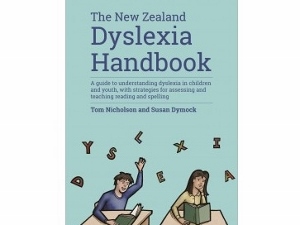

<p><img class=" alignright size-full wp-image-1357" src="http://schoolnewsnz.fastrackdev.com/wp-content/uploads/2015/03/Dyslexia-Handbook_Cover-209x300_300x225.jpg" alt="Dyslexia-Handbook Cover-209x300 300x225" style="margin: 5px; float: right;" width="300" height="225" />Too many students with dyslexia are falling behind because they don&#8217;t get adequate support, says a Massey University professor of literacy education and co-author of a new book on the topic.</p>
<p> <!--more--> </p>
<p>Professor Tom Nicholson, from the Institute of Education, is concerned at the lack of government progress in providing support for children who struggle to read because of the de-coding disorder that affects around one in 10 – or around 80,000 – New Zealand school-aged children.</p>
<p>But the rate of dyslexia could be reduced from 10 to two per cent if the right strategies were deployed in schools and at home, he says.</p>
<p>Titled The New Zealand Dyslexia Handbook (NZCER Press) and co-written with Dr Susan Dymock, from Waikato University, the book sets out to demystify dyslexia by empowering parents and teachers &#8220;at a grassroots level&#8221; with practical tips and information. These include reading and spelling tests to identify dyslexia, and language exercises to help overcome the condition that impairs the ability to de-code written language.</p>
<p>&#8220;There&#8217;s a lack of knowledge among parents and teachers about what to do and how to help these kids,&#8221; Professor Nicholson says.</p>
<p>&#8220;It&#8217;s a real tragedy, actually, because these are smart kids we&#8217;re talking about – they could be making greater gains.&#8221;</p>
<p>The jury is still out on the causes of dyslexia and why some have difficulties with visual or phonological processing and memorising of written words.</p>
<p>Professor Nicholson says the book is an &#8220;empowering resource&#8221; designed to deal with dyslexia symptoms through well-researched methods. The research is based on working over many years with children with reading difficulties, including dyslexia, who have attended after-school reading labs at Waikato University and Massey&#8217;s Auckland campus and summer reading programmes in South Auckland schools.</p>
<p>&#8216;Improvements don&#8217;t happen overnight. It can take between one and three years – but they do crack it,&#8221; he says.</p>
<p>While the education system provides some support – or &#8220;accommodations&#8221; – such as reader/writers for students sitting NCEA exams, there needs to be more understanding of dyslexia not just by special education teachers but throughout the teaching profession, he says.</p>
<p>&#8220;There are simple approaches teachers can adopt, such as extending or emphasising what they already do in the classroom,&#8221; he says.</p>
<p>The book&#8217;s release coincides with Dyslexia Advocacy Week (March 16-22), organised by the Dyslexia Foundation of New Zealand.</p>
<p>Empowering students with dyslexia and their parents and teachers is something Professor Nicholson feels strongly about.</p>
<p>&#8220;Dyslexia is mysterious to many people, yet it becomes easy to understand once you have some information about it,&#8221; he says. &#8220;It&#8217;s commonly ignored by schools and the community because of a lack of understanding, and people have taken on ideas that are not backed by research.&#8221;</p>
<p>The book contains case studies, profiles and stories about how students have overcome dyslexia, and comes with a DVD featuring interviews with parents, teachers and children coping with dyslexia.</p>

Since 2015, fewer students are completing secondary school, defined as remaining enrolled in education until…
As the country’s Indian population grows, so does demand for Indian languages like Hindi, Punjabi…
By promoting alternate qualifications, some schools may have undermined public trust in NCEA, explains an…
When young people immerse themselves in nature, they leave feeling physically, mentally, emotionally and spiritually…
Theatre is much more than performance. Deep skills can be developed across multiple curriculum areas,…
NZCER found generative AI tools are frequently used to support teaching and learning in primary…
This website uses cookies.